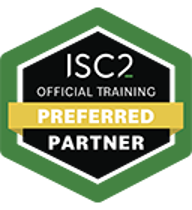ISC2 Certified Information Systems Security Professional (CISSP)
Book online today or, if you need help choosing the right course or would like to discuss business discounts, call us on 0113 220 7150.
From £3,850 + VAT
- SFIA
Skills Framework for the Information Age (SFIA) identifies and describes over 100 skills and 7 levels of job roles. To find out more, read What is SFIA?
Overview
The Official (ISC)²® Certified Information Systems Security Professional (CISSP®) training provides a comprehensive review of the knowledge required to effectively design, engineer and manage the overall security posture of an organisation. This training course will help students review and refresh their knowledge and identify areas they need to study for the CISSP exam. Content aligns with and comprehensively covers the eight domains of the (ISC)²® CISSP Common Body of Knowledge (CBK®), ensuring relevancy across all disciplines in the field of cybersecurity.
As an (ISC)²® Official Training Provider, we use courseware developed by (ISC)²® –creator of the CISSP CBK– to ensure your training is relevant and up-to-date. Our instructors are verified security experts who hold the CISSP and have completed intensive training to teach (ISC)²® content.
Target Audience
This training course is intended for professionals who have at least five years of cumulative, paid work experience in two or more of the eight domains of the (ISC)²® CISSP CBK and are pursuing CISSP training and certification to acquire the credibility and mobility to advance within their current information security careers. Individuals may be currently in roles such as: Security Consultant; Security Manager; IT Director/Manager Security Auditor; Security Architect; Security Analyst; Security Systems Engineer; Chief Information Security Officer; Security Director; Network Architect.
Learning Outcomes
After completing this course you should be able to:
- Understand and apply fundamental concepts and methods related to the fields of information technology and security
- Align overall organizational operational goals with security functions and implementations.
- Understand how to protect assets of the organization as they go through their lifecycle.
- Understand the concepts, principles, structures and standards used to design, implement, monitor and secure operating systems, equipment, networks, applications and those controls used to enforce various levels of confidentiality, integrity and availability.
- Implement system security through the application of security design principles and application of appropriate security control mitigations for vulnerabilities present in common information system types and architectures.
- Understand the importance of cryptography and the security services it can provide in today’s digital and information age.
- Understand the impact of physical security elements on information system security and apply secure design principles to evaluate or recommend appropriate physical security protections.
- Understand the elements that comprise communication and network security coupled with a thorough description of how the communication and network systems function.
- List the concepts and architecture that define the associated technology and implementation systems and protocols at Open Systems Interconnection (OSI) model layers 1-7.
- Identify standard terms for applying physical and logical access controls to environments related to their security practice.
- Appraise various access control models to meet business security requirements.
- Name primary methods for designing and validating test and audit strategies that support business requirements.
- Enhance and optimize an organization’s operational function and capacity by applying and utilizing appropriate security controls and countermeasures.
- Recognize risks to an organization’s operational endeavours and assess specific threats, vulnerabilities and controls.
- Understand the System Lifecycle (SLC) and the Software Development Lifecycle (SDLC) and how to apply security to it; identify which security control(s) are appropriate for the development environment; and assess the effectiveness of software security.
Course Outline
- Domain 1: Security and Risk Management
- Domain 2: Asset Security
- Domain 3: Security Architecture and Engineering
- Domain 4: Communication and Network Security
- Domain 5: Identity and Access Management (IAM)
- Domain 6: Security Assessment and Testing
- Domain 7: Security Operations
- Domain 8: Software Development Security
Certification
Recommended as preparation for the following exam:
(ISC)2 Certified Information Systems Security Professional
Gaining this accreditation is not just about passing the exam, there are a number of other criteria that need to be met including 5 years of cumulative, paid work experience in two or more of the eight domains of the (ISC)²® CISSP CBK . Full details can be found at https://www.isc2.org/cissp/default.aspx
Those without the required experience can take the exam to become an Associate of (ISC)² while working towards the experience needed for full certification.
Please note an exam voucher is included as part of this course.
DoD 8570 / 8140
Department of Defense ( DoD ) Directive 8570 / 8140 requires every full and part-time military service member, defense contractor and civilian employee with privileged access to US Department of Defense information systems (IS) to obtain industry certification credentials that have been accredited by the American National Standards Institute (ANSI).
DoD Information Assurance and Cybersecurity Personnel must be fully trained and be certified with baseline certification for their job category and level to perform their duties. The training, certification and workforce management requirements of Directive 8570 / 8140 applies to all members of the DoD IA and Cybersecurity Personnel workforces including military, civilians, local nationals, non-appropriated fund (NAF) personnel, and contractors. The requirements apply whether the duties are performed full-time, part-time, or as embedded duty.
An individual needs to obtain only one of the “approved certifications” for his or her category or specialty and level to meet the minimum requirement.

We are an (ISC)2 accredited CPE submitter.

QA is proud to be an (ISC)2 Official Training Partner.
Want to see all our (ISC)2 courses?

QA is an approved training provider for ELCAS, proud to support service leavers in their transition into the tech industry.
Why choose QA
- Award-winning training, top NPS scores
- Nearly 300,000 learners in 2020
- Our training experts are industry leaders
- Read more about QA
Special Notices
From April 2024 CISSP Exam weighting will change. Domain 1, Security and Risk Management, has increased in weight from 15% to 16% while Domain 8, Software Development Security, has decreased in weight from 11% to 10%.
Additionally, effective April 15, 2024, the time limit for the CAT exam will be a maximum of three (3) hours. Candidates taking the CAT version of the exam will see a minimum of 100 and a maximum of 150 items. The linear exam length will remain 6 hours for 225 scored items. Candidates taking the linear version of the exam will receive 225 total items.
For more information, please review our CISSP Exam Refresh FAQs or the CISSP Exam Outline. If you have further questions, please let me know.
This course is DoD 8570 & DoD 8140 compliant.
Related courses
Cyber Security learning paths
Want to boost your career in cyber security? Click on the roles below to see QA's learning pathways, specially designed to give you the skills to succeed.
Cyber Defensive Operations learning paths
Want to boost your career in Cyber Defensive Operations? View QA's learning pathways below, specially designed to give you the skills to succeed.

Frequently asked questions
How can I create an account on myQA.com?
There are a number of ways to create an account. If you are a self-funder, simply select the "Create account" option on the login page.
If you have been booked onto a course by your company, you will receive a confirmation email. From this email, select "Sign into myQA" and you will be taken to the "Create account" page. Complete all of the details and select "Create account".
If you have the booking number you can also go here and select the "I have a booking number" option. Enter the booking reference and your surname. If the details match, you will be taken to the "Create account" page from where you can enter your details and confirm your account.
Find more answers to frequently asked questions in our FAQs: Bookings & Cancellations page.
How do QA’s virtual classroom courses work?
Our virtual classroom courses allow you to access award-winning classroom training, without leaving your home or office. Our learning professionals are specially trained on how to interact with remote attendees and our remote labs ensure all participants can take part in hands-on exercises wherever they are.
We use the WebEx video conferencing platform by Cisco. Before you book, check that you meet the WebEx system requirements and run a test meeting (more details in the link below) to ensure the software is compatible with your firewall settings. If it doesn’t work, try adjusting your settings or contact your IT department about permitting the website.
How do QA’s online courses work?
QA online courses, also commonly known as distance learning courses or elearning courses, take the form of interactive software designed for individual learning, but you will also have access to full support from our subject-matter experts for the duration of your course. When you book a QA online learning course you will receive immediate access to it through our e-learning platform and you can start to learn straight away, from any compatible device. Access to the online learning platform is valid for one year from the booking date.
All courses are built around case studies and presented in an engaging format, which includes storytelling elements, video, audio and humour. Every case study is supported by sample documents and a collection of Knowledge Nuggets that provide more in-depth detail on the wider processes.
When will I receive my joining instructions?
Joining instructions for QA courses are sent two weeks prior to the course start date, or immediately if the booking is confirmed within this timeframe. For course bookings made via QA but delivered by a third-party supplier, joining instructions are sent to attendees prior to the training course, but timescales vary depending on each supplier’s terms. Read more FAQs.
When will I receive my certificate?
Certificates of Achievement are issued at the end the course, either as a hard copy or via email. Read more here.
